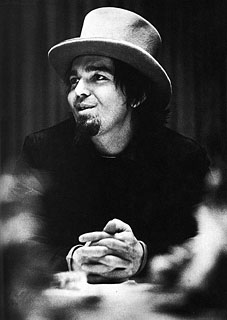Mission: unlistenable
His music is described as a metal sock, an action painting and a mad, giant watch—yet it has inspired bands from Talking Heads to the White Stripes. John Harris gets to grips with Captain Beefheart
John Harris
Friday August 4, 2006
The Guardian
IN THE 1980s, American researchers found that the average album was played 1.6 times. Given the new practice of impatiently scouring a CD for one or two highlights and then discarding it, the iPod age has presumably seen that figure tumble, but the basic point remains: most of the music we buy lies pretty much unplayed – either because it is rubbish, or because it says a lot more about our vanity than what we actually like. On the latter score, history’s most shining example may be Trout Mask Replica by Captain Beefheart and His Magic Band, an allegedly classic album that must surely sit undisturbed in thousands of households. Playing it—or rather, attempting to—is a bit like being in one of those cartoons in which the principal characters cagily open a door, only to find all hell – elephants, possibly, or a speeding train – breaking loose behind it, whereupon they slam it shut again. Its opening moments let you know what you’re in for: a discordant racket, all biscuit-tin drums and guitars that alternately clang and squall, eventually joined—apparently by accident—by a growling man complaining that he “cannot go back to your land of gloom”. Skipping through the remaining 27 tracks does not throw up anything much more uplifting. Indeed, one song finds the same voice rather distastefully evoking the Holocaust: “Dachau blues, those poor Jews/ Dachau blues, those poor Jews/ One mad man, six million lose.”
When this kind of experience happens to a rock critic, it can easily bring on a chill feeling of inadequacy. After all, Beefheart—those in the know rarely use the “Captain”—remains a gigantic influence on so much rock music that has claimed to stand as something more than mere entertainment, from the post-punk likes of Pere Ubu, Talking Heads, Gang of Four and Public Image Limited, through names as varied as Tom Waits and Happy Mondays, and on to such talents as PJ Harvey, Franz Ferdinand and the White Stripes. Equally importantly, he is a crucial part of the gnomic culture through which those people (men, mostly) whose lives have been hopelessly afflicted by music commune with one another. It’s not in the film, but the Jack Black character in High Fidelity was surely a Beefheart obsessive.
Continues here.


when i first heard trout mask i hated it, the only thing that made me relisten (eventually), was the fact that all the other albums (except blue jeans and unconditionally guaranteed) had grown on me so much, i knew the same thing would happen with trout mask
like clear spot did to you, certain tracks ‘appeared’ to me, i remember ‘smithsonian institute blues’, ‘making love to a vampire…’ and ‘floppy boot stomp’ in particular. i listened to trout mask a lot before it ‘appeared’ to me, ‘shes too much for my mirror’ was the only track i liked at first.
im not sure training yourself to like beefheart is possible, or even advisable, because for me, all other music now sounds boring, and i can only listed to something for a short while before having to revert back, its been like this for about 5 years now.
thanks for your review, it was a good read.
Thanks for your comments, I agree with the way you feel towards Beefheart. Kepp up the great posts!
Oh, I took to Trout Mask immediately. Had my Dad get a copy taped from a mega-collector of records, and it was an immediate hit with me. Especially when cannabis was in the atmosphere, though that is not a prerequisite. Another friend across the state started a mini dance craze in his dormitory set to “The Blimp”. Doc is terrific, Decals is great (I have a CD copy, must be OOP now?), and if you haven’t heard Beefheart songs like “Odd Jobs”, you’ve been missing out. Beefheart is a true artist, and one with a great sense of humor. Don’t take him seriously or you’re missing the jokes.